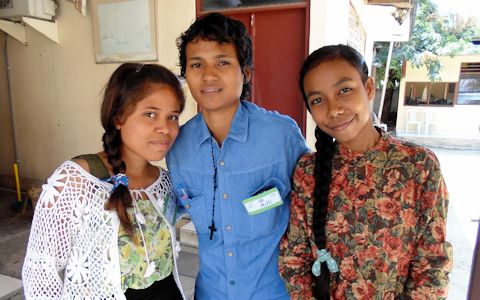Young women inspiring change in Timor-Leste and beyond
Date:
In the midst of a room filled with 30 young women, buzzing with enthusiasm and ideas, one young woman stands up behind her desk to be heard.
“We must not just reach out to women, but also to men, to parents, to children, and to every member of our community if we want to deliver our message of gender equality,” says Yane Elfrida Domingas Maia, an alumna of the Parliamentu Foinsa’e Nian Timor-Leste, also known as the Timor-Leste Youth Parliament.

Yane is attending a training workshop along with 29 other young women from across all of Timor-Leste’s 13 districts. The workshop was organized by the International Women’s Rights Action Watch Asia Pacific (IWRAWAP) in collaboration with the Alola Foundation, a local NGO dedicated to improving the lives of women and young children, with support from UN Women.
The five-day workshop builds the capacity of the attendees by teaching them the importance of critical thinking and evidence-based arguments when advocating for political change. Its focus on the Convention on the Elimination of All Forms of Discrimination against Women (CEDAW) aims to give the young women tools they need to be capable of recognizing gender discrimination, as well as the ability to advocate for change using the international law.
Despite Timor-Leste’s great gains in women’s rights, which include the accession to CEDAW in 2003, and the 2010 establishment the Law against Domestic Violence, the young women attending the workshop recognize that there is a lot more work to be done to ensure the fight for gender equality continues.
A brief conversation with Yane and two of her colleagues, Maria Abrantes and Juliana de Fatima, revealed the impact the workshop has already had on the way the young women think about gender issues on a local and global scale.
“CEDAW makes it clear that women should have equal rights to men, so women have a right to be involved in politics,” says Juliana. “A woman can become the President, a woman can become a Member of Parliament. It’s not only men who should be having a say.”
Maria, inspired by CEDAW and its demand for equality, believes that the lessons the young women have learned at the workshop will empower them to influence changes within their own communities, and beyond. “It is important to understand CEDAW because it is a policy that acts as an umbrella, protecting all women across the globe. We not only need to be aware of the constitutional and penal codes in Timor that protect our rights, but we also need to understand that CEDAW is an international instrument that we can use to ensure that all women are protected from discrimination and that our laws respond to this right.”
Yane, Maria and Juliana’s passion for women’s rights will not end with the workshop. While discussing their plans for the future Yane claimed, “It is my ambition to bring change to women’s lives and to achieve gender equality by working to eliminate discrimination against women and girls. I plan to use the advocacy techniques we have learned through this workshop to do this.”